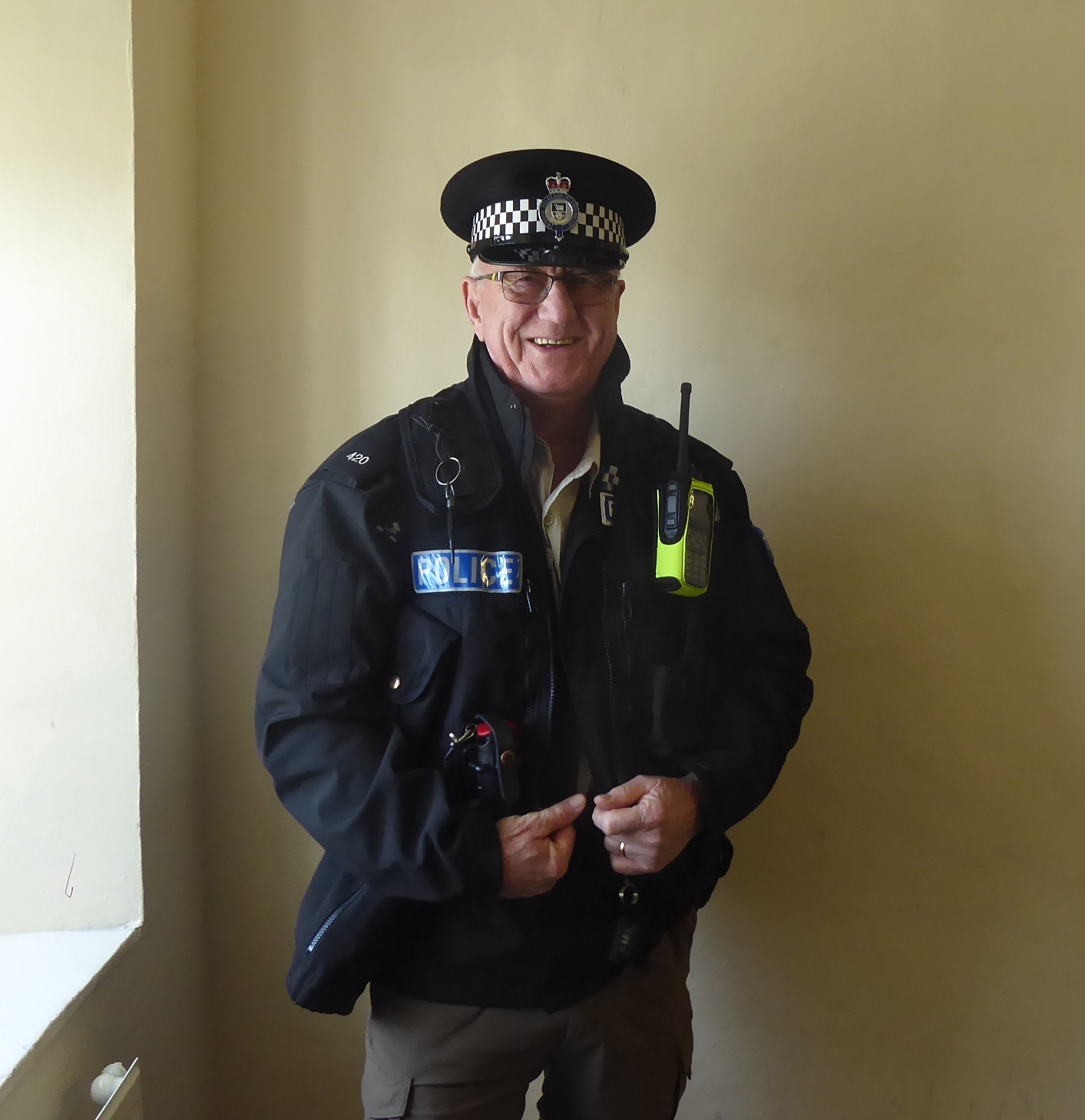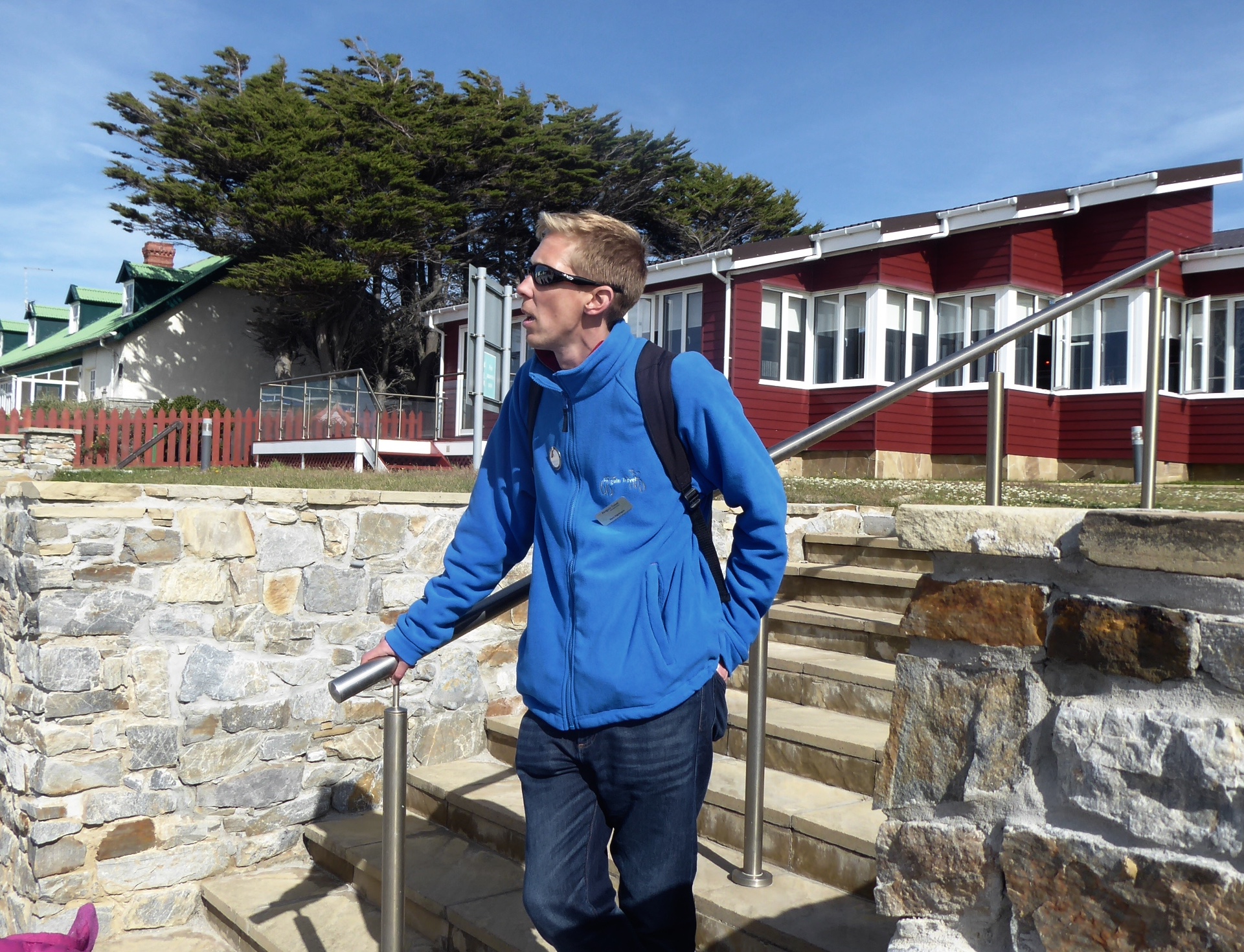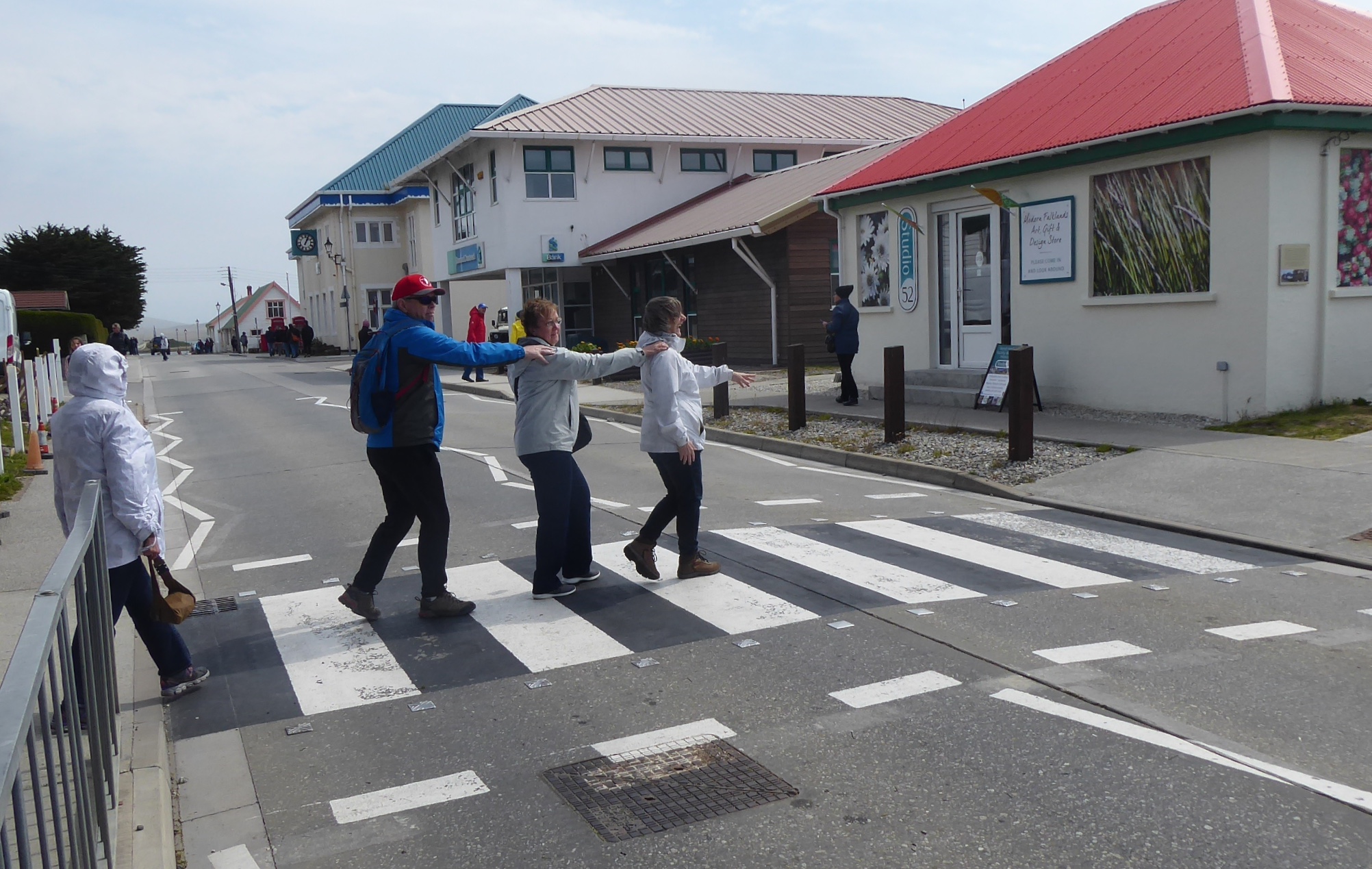Posts Tagged ‘Falkland Islands’
The Falkland Islands
For Lynn, Esther and Garth, this was not exactly Abby Road, but they tried. One thing for certain, the Falkland Islands are British to the core.
(Check out the Slideshow (2.41 minutes) in the footer)
Links to other Posts
A South American Adventure The introductory Post
Peru, A Different Perspective: Includes Slideshow
Peru and the Inca: Back to the Future Inca Agricultural Research
A Long Day, A Hard Life: Comparisons between Peru and Canada
This post developed from an earlier Facebook entry.
While in the Falklands I met a few people in the local Constabulary (The Royal Falklands Police) some of whom were retired police members from other Commonwealth countries (mainly Britain). A few traveled to the Falklands in order to take on a two-year assignment. While a few will likely return, others are there to stay. I was fascinated by the mix of old and new in the department HQ, as it was much like the department where I spent my thirty-year career.
Lynn encouraged me to consider applying as she stated she would be more than happy to move to the Falklands for a couple of years. Given the friendly people and a climate not all that different from our home here in Victoria, it seems certain we would love the place and its people. If I was a decade younger, and without as many irons in the fire as here in Victoria, it is something I would consider. Oh, and it felt good to be back in the harness. Of the many things I loved about being in the service, was walking the street in uniform and greeting people. Ah, perhaps in the next life the opportunity will arise.
What it means to be a Falklander
Even though the permanent resident population is small (3400) it operates as a Parliamentary Dependency under a Constitutional Monarchy. The people I spoke to (police, fire, ambulance) left me with the impression the Falklands War helped the Islanders to coalesce as a country with purpose. I was told that prior to the war, they pretty much existed without seeing themselves with a collective purpose and a vision for the future, other than being British.
One of the downsides in the aftermath of the war is the acrimony that continues with Argentina. The result, most trade, and essential needs are met by traveling to Chili, or Uruguay, their nearest friendly neighbors, and, if necessary, to Britain, which, for a return trip, is over well over half a world away (26,000 km).
With only one flight in (and out) each week, the country remains relatively isolated. Even though the permanent population is small, they have excellent public facilities, with schools, recreation, businesses, etc. being as good or, in many cases, better than you might find in many small towns in Canada. I suppose that’s why temporary workers coming to the country qualify for many perks (vehicle, housing assistance, etc.) as that helps to make their journey doubly worthwhile.
While specialized hospital care and advanced treatment facilities are limited, the government provides free transport and pays all the costs of those who must travel out of the country for treatment. We heard of one resident who has been confined to a hospital in England for over a year.
Tourism and Employment
With over 55,000 cruise tourists each year and a further 1,400 land-based travellers, the Islands are always in desperate need of full and part-time employees, across the spectrum, from labour to professional. If I was a young person (professional or otherwise) and wanted a change, I would certainly look at the Falklands as a place to do something very different, particularly if they wished to get away from the rat race of a big city.
The young man in this photo (our tour guide) came to the Falklands with his bride and they now have their first child (born on the Islands). They intend on returning to England in a couple of years, but I wonder if they will.
I think she is employed as a teacher and he as a tour guide during the season and in other jobs in the offseason. I sense they both love life on the Islands and may well decide to stay.
What caught Lynn and Esther’s attention was the number of craft shops. I rather expect the two of them, the crafters they are could make a reasonably good living by creating in the winter and selling to the tourists during the short tourist season.
Now, a bit more about the weather. First, we are told the wind never stops and, in addition, it is likely always a bit chilly. If you are a sun and sand lover, the Falklands is probably not a good choice. While, as mentioned, the range in weather is much like Victoria, in that part of the Atlantic (12oo kilometers from the Antarctic Peninsula), and a stone’s throw from the tip of South America, you are close to a stretch of water that goes down in the books as one of the most dangerous on the planet.
As large cruise ships cannot dock, passengers must travel to the Island by tender and while the weather was moderately good on our trip, our tender was still handily tossed about as evidenced by at least a couple of folks becoming rather seasick. In the footer, I have added a bit more information about the Falklands from my friend Wiki.
Following is a short slideshow of our ever so short visit.
Song: Welcome to my Little Corner of the World
by Connie Smith (a 1960 Country Hit)
A bit more background from Wiki:
The Falkland Islands (/ˈfɔːlklənd/; Spanish: Islas Malvinas, pronounced [ˈislas malˈβinas]) is an archipelago in the South Atlantic Ocean on the Patagonian Shelf. The principal islands are about 300 miles (483 kilometres) east of South America‘s southern Patagonian coast, and about 752 miles (1,210 kilometres) from the northern tip of the Antarctic Peninsula, at a latitude of about 52°S.
The archipelago, with an area of 4,700 square miles (12,000 square kilometres), comprises East Falkland, West Falkland and 776 smaller islands. As a British overseas territory, the Falklands have internal self-governance, and the United Kingdom takes responsibility for their defence and foreign affairs. The Falkland Islands’ capital is Stanley on East Falkland.
Controversy exists over the Falklands’ discovery and subsequent colonization by Europeans. At various times, the islands have had French, British, Spanish, and Argentine settlements. Britain reasserted its rule in 1833, although Argentina maintains its claim to the islands.
In April 1982, Argentine forces temporarily occupied the islands. British administration was restored two months later at the end of the Falklands War. Most Falklanders favour the archipelago remaining a UK overseas territory, but its sovereignty status is part of an ongoing dispute between Argentina and the United Kingdom.
The population (3,398 inhabitants in 2016)[7] primarily consists of native-born Falkland Islanders, the majority of British descent. Other ethnicities include French, Gibraltarian and Scandinavian. Immigration from the United Kingdom, the South Atlantic island of Saint Helena, and Chile has reversed a population decline. The predominant (and official) language is English. Under the British Nationality (Falkland Islands) Act 1983, Falkland Islanders are British citizens.
The islands lie on the boundary of the subantarctic oceanic and tundra climate zones, and both major islands have mountain ranges reaching 2,300 feet (700 m). They are home to large bird populations, although many no longer breed on the main islands because of competition from introduced species. Major economic activities include fishing, tourism and sheep farming, with an emphasis on high-quality wool exports. Oil exploration, licensed by the Falkland Islands Government, remains controversial as a result of maritime disputes with Argentina.
(398)

